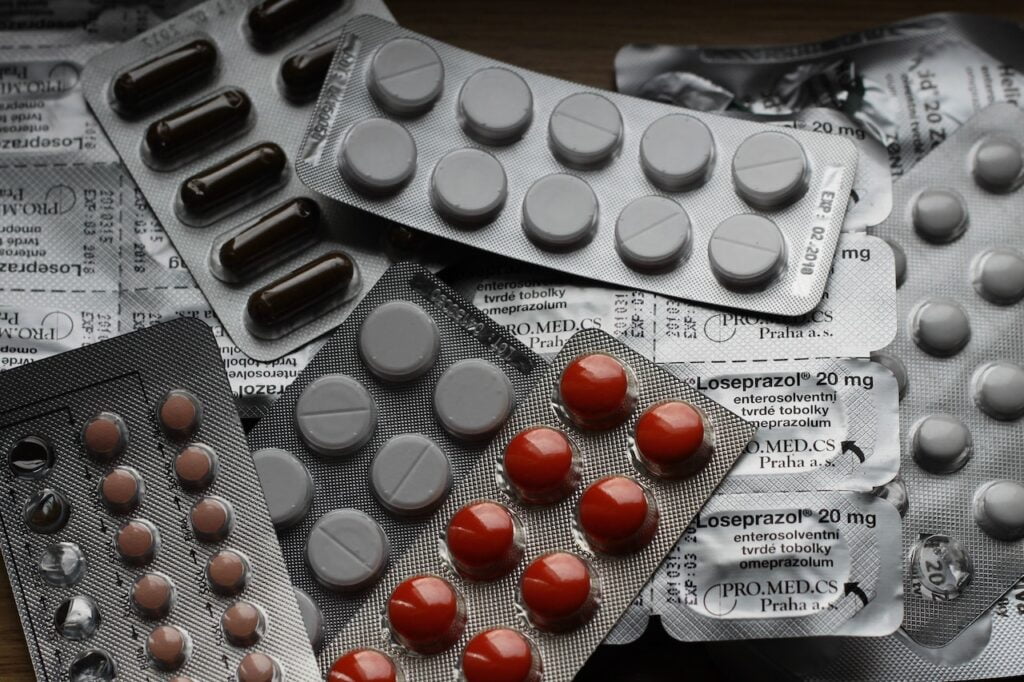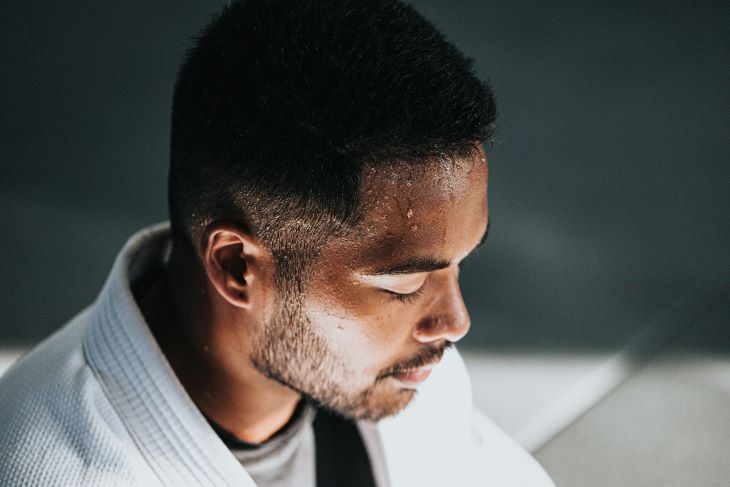- Home
- Types of Addiction
- Pain Medication Addiction Help & Treatment
Pain Medication Addiction Help & Treatment
While many people might be prescribed pain medication by a doctor, it’s useful to be aware of the risks. As many of the meds used are opioid-based, painkiller addiction can develop.
This might happen to the person who is prescribed the medication, or in the case where someone is illegally using someone else’s prescription.
It might be surprising to hear that the “UK has the highest consumption rate of prescription opioids for pain management per capita in the world”.[1]
Opioid addiction is a brain disorder that affects thoughts and changes behaviours. Educating yourself helps you remain on the lookout for signs of problematic use, and you’ll also have the knowledge of what treatment options there are.
Pain medication – synthetic opioid addiction

Pain medication, mainly opioids, is prescribed by doctors to relieve severe pain. It’s especially linked to treating pain after surgery and in relation to end-of-life care (including for cancer pain).
The powerful painkillers that are used have great potential for addiction. This can occur when a psychoactive substance (such as opioids) causes particular effects that a user may desire.
Prescription opioids can lead to opioid use disorder when the patient stops following doctor’s guidelines around dosage and takes the medication as and when they want and in relation to cravings.
What addictive pain medications are there?
The opiate medication used in relation to chronic pain management include:
They’re mainly prescribed as skin patches, tablets, and liquids. People who abuse them might swallow, snort, smoke, or inject prescription painkillers.
At Rehab Recovery, we offer free advice from a team of non-judgemental professionals, many of whom are in recovery and understand how hard it can be to change your relationship with addiction.
For more information about pain medication addiction, simply reach out to our 24/7, confidential hotline on 0800 088 66 86.
Common side effects of using opioid drugs

You might assume that opioid-based medication causes euphoric effects. This is a common misconception. While street heroin can do this, man-made opiate medication doesn’t; it exists to relieve pain (or reduce cravings, in the case of methadone).
Using opioids long-term can lead to unpleasant health conditions. This is obviously why they’re only prescribed in particular circumstances.
Common health effects include:
- Stomach pain
- Constipation
- Reduced cognitive functioning
Dangerous side effects include:
- Heart problems
- Liver and brain damage
The symptoms of opioid use disorder
As with all addictions, there are signs you can look out for that make it clear that problematic use has developed:
- Not being able to stop taking the pain medication. You might have failed to “quit” a few times already
- Shallow or slow breathing has developed
- Regularly feeling agitated or experiencing mood swings
- Experiencing a loss of motivation, interest in usual activities and the desire to do things
- Increasingly poor decision-making
- Prioritising taking the substance, using more than the recommended dose or taking the medication when you don’t have pain, or when it’s not needed
- Hiding the amount you’re taking from other people
- People you care about worrying about how much you’re taking, or recent changes in your personality or behaviours
- Experiencing cravings and symptoms of withdrawal. You might also have developed drug tolerance meaning you take more in order to feel an effect of the drug
If you have any of the above symptoms then it’s likely you have an addiction and would benefit from talking to a professional about what to do next. The Rehab Recovery team can help you with this if needed (more information coming up).
What happens during an opioid overdose?

It’s important to be aware that, although, pain medication might be prescribed and legal, actually if used in an illegal way, it can easily lead to overdose. This is especially dangerous with opioids because of their physiological effects. Symptoms of overdose include:
- Snoring or gurgling sounds
- Slowed breathing
- Slowed heart rate
- Feeling cold and clammy to touch
- Discoloured lips and fingertips
- Becoming unresponsive or loss of consciousness
At its worst, overdose can lead to coma and death.
At Rehab Recovery, we offer free advice from a team of non-judgemental professionals, many of whom are in recovery and understand how hard it can be to change your relationship with addiction.
For more information about pain medication addiction, simply reach out to our 24/7, confidential hotline on 0800 088 66 86.
What leads to pain medication addiction?

Opioid medication is prescribed to stop pain signals in the brain. As well as stopping pain, they are very relaxing. To some people these effects can be desirable and so they might start using the medication outside of guidelines.
Doing so can lead to a tolerance building up meaning the person will take more of the medication than they should in order to feel an effect.
There are particular situations that make the development of addiction more likely:
- Where opioids are prescribed where other analgesics could have been just as effective
- Where people have experienced deep emotional pain or trauma. This is because people find the pain relief of analgesics difficult not to return to. Within treatment, this will also be addressed by therapists
- Where a person is predisposed to develop an addiction; this is linked to individual personality (i.e. a person who is pleasure seeking), genetics as well as brain structure
- Where a person has a history of substance misuse
What is opioid dependency?

Developing a physical dependence is a true risk where opioids are used. This is why it’s so important only to use medication as a doctor dictates. A dependency can develop without the formation of an addiction.
It’s where a person starts to need the substance in order to function normally and without it, they can experience withdrawal symptoms. They won’t however, experience psychological cravings (as in the case of addiction).
Symptoms are:
- Insomnia
- Anxiety
- Hallucinations
Physical symptoms include:
- Cold-like symptoms such as a runny nose
- Sickness and diarrhoea
- Hallucinations
- Muscle and bone pain
Tips to avoid pain medication addiction
The most effective way of avoiding pain medication addiction is to follow dosage guidelines, and keep talking to your doctor.
Also, it’s helpful to be aware of the signs of addiction. For instance, ask yourself, “Do you take the medication even when you don’t have pain?” Keep in tune with your mind and body. The sooner you spot signs, the sooner you can address the problem.
What to do if you think you’re addicted to pain medication

There are a few useful things you can do if you’re concerned you might have developed an addiction to your pain medication (or if you’re using someone else’s medication).
Firstly, ask for help. Choose someone you trust, perhaps a family member or a friend. It’s obviously advisable to talk to a professional, someone who understands the medication (i.e. the GP) as well as addiction.
Secondly, contact NHS addiction treatment services as these can provide harm reduction advice and guidance if the addiction is mild.
Finally, you can seek addiction treatment at rehab treatment clinics. This is the most beneficial way to go about treating a moderate to severe addiction. A conversation with Rehab Recovery can help you around this if necessary.
It’s important to acknowledge that it’s very easy to misuse medication if you’re in a lot of pain or have a predisposition to addiction. Communication with professionals is really important to keep your health as best supported as possible.
At Rehab Recovery, we offer free advice from a team of non-judgemental professionals, many of whom are in recovery and understand how hard it can be to change your relationship with addiction.
For more information about pain medication addiction, simply reach out to our 24/7, confidential hotline on 0800 088 66 86.
Treating pain medication addiction

According to the National Institute on Drug Abuse there are two main ways to treat addiction to opioids; through behavioural therapies and addiction medication.[2]
This approach is referred to as medication-assisted treatment. In many cases, people might also use herbal medicines (i.e. milk thistle) and participate in holistic therapies (i.e. ear acupuncture, yoga, reiki etc.). This would all be directed by a professional team at a rehabilitation clinic.
Pain medication addiction – therapies
The main type of therapy used to treat the psychological aspect of opioid addiction is cognitive behavioural therapy (CBT). This is scientifically proven to effectively treat addiction.
CBT supports a person to manage cravings, to avoid triggers effectively, and to develop healthy habits. All of this is key.
As well as this, private rehab clinics offer a range of other therapies and activities that come together to form a solid basis to build recovery on:
- Motivational interviewing
- Dialectical behavioural therapy
- Counselling
- Art therapy
- Music therapy
- Equine therapy
- Group therapy
- Family therapy
- Meditation, yoga, ear acupuncture, reiki etc.
What is a pain medication detox?

Addictive pain medication needs a careful approach in terms of physically weaning you off the substance.
Going “cold turkey” can cause incredibly distressing effects. This is because of how opioids affect brain chemicals and physiological processes in the body.
Interestingly, to come off pain medication safely, you’re likely to be prescribed opioid-based medication such as methadone or buprenorphine.
These are administered at rehab in a tapered-off fashion (i.e. slowly reducing doses across 7, 10, or 14 days). This approach to medication prevents withdrawal.
- Methadone is an opioid agonist that stops withdrawal symptoms and cravings
- Buprenorphine (brand names are Subutex, Suboxone, and Temgesic) is a partial opioid agonist that reduces cravings
Neither of these medications cause a high. The fact that they stop cravings and withdrawal provide an easier basis from which you’re able to focus on the psychosocial treatments and therapies that are offered.
At Rehab Recovery, we offer free advice from a team of non-judgemental professionals, many of whom are in recovery and understand how hard it can be to change your relationship with addiction.
For more information about pain medication addiction, simply reach out to our 24/7, confidential hotline on 0800 088 66 86.
Polysubstance use treatment

In some cases, substance use disorders develop alongside pain medication addiction. This is when people use various drugs and/or alcohol simultaneously. It’s a complex situation and people who use different substances are likely to be assessed as living with severe addiction.
In relation to treatment, each addiction should be addressed. This is most effectively done at a private rehab clinic where you’ll receive a care plan that focuses on your relationship with each substance.
Please be aware that mixing substances is very dangerous because of the way they can react to each other as well as the increased risks to you.
Overdosing is a real risk. This is especially a concern where opioids are combined with other depressants, such as alcohol.
If you’re worried about your own polysubstance use, it’s imperative to talk to a doctor or addiction specialist.
What you need to recover from pain medication addiction

If you have an opioid abuse addiction, then it’s beneficial to be aware of a few things that are essential in relation to recovery.
It’s important that you’re aware of the level of commitment required to overcome the addiction. Rest assured, though, that if you’re committed to recovery it is possible and with the passing of time it’s increasingly easy to maintain sobriety.
Another thing that is useful to keep in mind is that you’re going to need both personal support (i.e. from family and friends you can trust) as well as professional input (i.e. private treatment or support through NHS drug services).
Get the support you need to quit pain medication today
If you’re addicted to your own or someone else’s prescription medications, then you’re probably wondering what to do next.
Trying to quit on your own is notoriously difficult because of the physical dependency that develops as a result of opioid abuse. This is one of the (many) reasons that people relapse or continually “fail to quit”.
To find out what organisations there are near to you that can support you to quit pain medication, contact the Rehab Recovery team.
We offer a free, no-obligation assessment where we ask some questions to clarify the level of your addiction, your circumstances, and what treatment would be most suitable.
Contact us now for advice on what to do next.
FAQs

Below, we outline some frequently asked questions about pain medication addiction and recovery:
What treatment is there for opioid use disorder?
The main types of treatment for opioid use disorder is cognitive behavioural therapy and medication-assisted treatment. The latter is where a doctor prescribes an opioid-based medication to wean you off the problem substance.
What medications help chronic pain?
The safest medication for pain is paracetamol. Anti-inflammatories such as ibuprofen might also be used. For long-term or chronic pain, opioid-based medications might be prescribed and should only be taken following a doctor’s guidelines.
What help is there for a Suboxone taper?
If you need a Suboxone tapered detox, you can access this through a private rehab clinic. You might also be able to access one through NHS drug services after a discussion with your GP or an addiction specialist at the centre.
Is it possible to stop pain medication addiction?
It is possible to overcome an addiction to pain medication. The best way of doing this is through a rehabilitation programme.
You can access one privately at a rehab clinic where you’ll be supported by a team of staff who will provide a variety of physical and psychological treatments.
At Rehab Recovery, we offer free advice from a team of non-judgemental professionals, many of whom are in recovery and understand how hard it can be to change your relationship with addiction.
For more information about pain medication addiction, simply reach out to our 24/7, confidential hotline on 0800 088 66 86.



